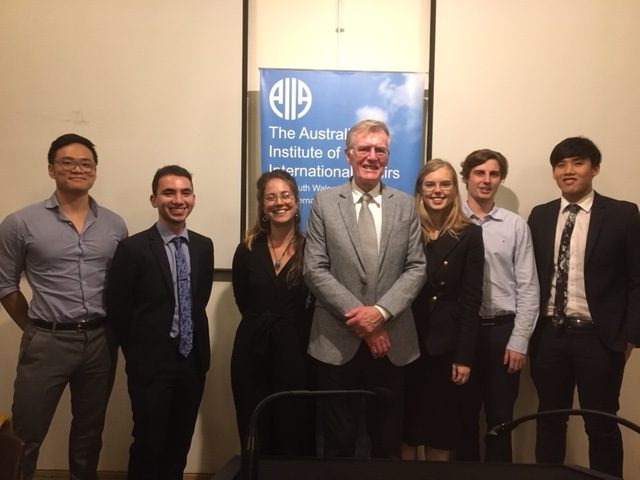“The International Rules-Based Order is Dead”
AIIA NSW hosted its regular interns’ debate on Tuesday 29 May. Arguing that the international rules-based order is dead were current interns Diana Lambert and Alex Tu, joined by 2017 intern Mitchell Travers. The negative team were Isabella Svinos, Michael Nguyen and Chris Khatouki.

From left to right: Michael, Chris, Isabella, Kevin, Diana, Mitch and Alex
It’s dead
Some main points made in the affirmative were that the decline in US hegemony, matched by Russian actions over Syria and Crimea and Chinese expansionism in the South China Sea, had issued a fatal challenge to the liberal word order painstakingly put in place ever since World War II. The rules-based order depended on the compliance of individual state actors: there were no substantial international authorities with enforcement capability. That order had in any case remained patchy: the US, for example, had still not signed up to the Law of the Sea Convention.
The old order had survived in a bipolar and unipolar world, but not under the current multipolar uncertainties – it had been created by the post-war winners, and they could no longer set the rules. New economic players such as Uber, Bitcoin and AirB&B subverted familiar nation-based rules. Brexit had undermined the achievement of a more orderly Europe; Trump had trumpeted protectionism at the expense of mutually-profitable international trade.
The liberal order had been further undermined by Russian hacking of elections in the US and Britain and alleged lawless actions such as the Skripal poisonings and the shooting down of MH17. Infractions by smaller powers might not threaten stability, but when major powers retreated from international commitments and norms of behaviour the whole system was weakened. ASEAN, for example, had become divided over responses to Chinese conduct in the South China Sea, with some members advocating compliance with established international law while others, anxious not to upset their major trading partner, were seeking bilateral understandings with China.
China was seeking to replace existing cooperative arrangements with its own structures – its one-belt-one-road initiative was an attempt to overtake current international trade agreements; the Asian Infrastructure Investment Bank sought to supplant the World Bank and its offshoots; the Regional Comprehensive Economic Partnership (RCEP) had been an attempt to dislodge the Trans-Pacific Partnership (TPP) proposal.
A plethora of bilateral free-trade agreements were replacing and undermining the post-war GATT multilateral free trade achievements. In Europe, Russia’s perceived strategic concerns were leading to collision with NATO and the EU. US and Russian actions in Syria had made no pretence of seeking UN endorsement.
It survives
The negative team pointed to the continued compliance by the vast majority of countries with established rules of behaviour between international players; individual violations did not mean that the whole system had ended. In the face of such actions as Britain’s moves to leave the EU and US withdrawal from the Paris agreement on climate change and the TPP, the other signatories had adapted to the new situation and found ways of giving new life to their structures.
A list of long-standing UN and other international bodies remained fundamental to world order: the ILO, the WTO, the OAS, the Commonwealth, ASEAN and many others. China had complied with sanctions against its longstanding ally, North Korea, over its nuclear program. The International Atomic Energy Agency, despite its slightly-archaic name, was busier than ever. The US continued to value UN Security Council endorsement of its international actions whenever possible. ASEAN was working with China to develop a code of conduct for the South China Sea.
Technological change had reduced the significance of national boundaries and expanded the role of international cooperation. Cyber space had increased the relative power of smaller players. The established international order was not dead, merely in transition.
Not everything about China’s emergence and the on-going challenges to US hegemony was necessarily damaging to world order. Even if the “liberal” word order was under challenge – if that meant particular forms of political structure and economic policy – that did not necessarily mean that all the rules had been abandoned. In fact new requirements meant that new rules for orderly behaviour between states were coming into place, for example with cyber technology and the peaceful use of outer space.
China and Russia had issued their challenges. But the fact was that international order remained in place and major world conflict continued to be avoided.
The winners
Our adjudicator, international human rights law scholar and former senior diplomat Kevin Boreham, awarded victory by a slight margin to the negative team. He said both sides had put forward strong arguments, and he complimented them on their presentations. The affirmative team had made good points about the damaging effects of recent US, Chinese and Russian behaviour; there was much current evidence of decline in international commitment to liberal norms. But the negative team had been able to show the many ways in which the world at large continued to abide by agreed standards and to establish new areas of cooperative international behaviour.